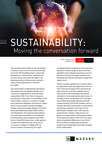
Sustainability: Moving the conversation forward
Sustainability: Moving the conversation forward
How sustainability is understood by businesses and investors has changed dramatically since it was first considered within corporate social responsibility (CSR) in the 1960s. It has grown from being an annual report to shareholders of the actions taken in relation to a company’s broader social and ethical obligations to become an integral part of many companies’ business strategies.
There is no global agreement on corporate social or sustainability reporting requirements. At the regional level, the European Union (EU) does have unified sustainability reporting, enforced through Directive 2014/95/EU. However, much of the push behind the incorporation of sustainability into business operations is coming from the globalisation of supply chains, and mounting pressures from investors, asset owners, non-government organisations and the general public for companies to report on ESG risks. As a result, there are significant differences in how the US, the EU and Asia are developing frameworks, programmes and legislation to achieve the global shift to sustainability.
Europe – money talks
In January 2018, the European Commission (EC) laid out plans to cement sustainability into the European financial system. It suggested introducing a classification system of what is “sustainable” and measures to impose conditions on corporate reporting requirements and the duties asset managers had to investors.
Many of the EC’s suggestions are already being put in place. Further EU legislation should be agreed by 2019 to compel the financial industry to deliver the €180bn needed each year to hit Europe’s climate change targets.
China – sustainability an economic value-add
Rapid economic growth has left China facing some of the most severe environmental issues on the planet. Whilst recognising the investment cost required, China views sustainability as an opportunity for its companies to develop innovative technologies that will allow the country to move up the value-added export chain. What is clear is that it wants a return on its environmental investments. By focusing on research and development, China hopes to lead the world in environmental technology.
However, China still has to contend with the social and economic pressures that have built up as the country has developed. Failing to address these sustainability issues could have serious future cost, reputation and growth consequences for businesses in China.
US – The states and market rebel
President Donald Trump has made it very clear he is no fan of climate change initiatives. But not everyone agrees with him. In June 2018 the US Senate rejected his plans for deep cuts to renewable energy research budgets and individual states are developing their own projects without the need for federal regulation.
Individual states are piling yet more pressure on coal. California has set ambitious clean energy targets. Other states are pushing out polluters, promoting electric vehicles and pollution caps. Even where states are lagging, market forces are doing the heavy lifting. Consumers are demanding change and business is being forced to respond.
Getting traction
When implementing regulatory measures, companies have started to realise the benefits of a sustainable approach: their operations, enriched risk management, strengthened stakeholder relationships, costs savings, value creation and improved market positioning.
What is becoming clear is that by improving existing voluntary standards and practices, business, society and government can get closer to achieving a more sustainable future. Regulation does have a role to play, but it can be used to encourage and not just punish.
Download the full article on which this article is based below and gain deeper insights on the impact that regulation can have on sustainability across the world.
Want to know more?



